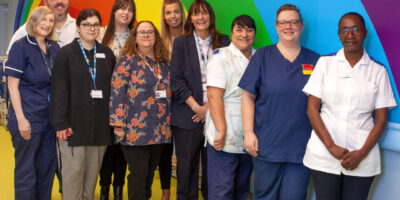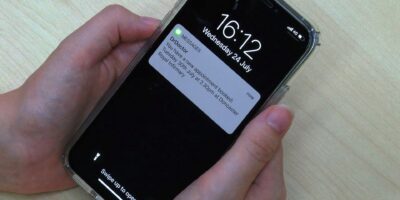Following the outbreak of Covid-19, the Trust took the difficult decision to restrict visitors with the aim of reducing the further spread of the disease.
At the outset of the Covid-19 pandemic, the Trust took the difficult decision to restrict visitors with the aim of reducing the further spread of the disease. This followed national guidance implemented across the NHS, and only permitted people to come to hospital under very specific circumstances.
As the Trust has seen a steady decline in cases of the illness throughout the past number of the weeks, health professionals within the organisation are pleased to be able to ease certain restrictions, across a range of services.
Doctors and nurses at the hospitals are urging that visitors should only come if they are well, and are not showing any signs or symptoms of Covid-19. This includes a high temperature, a persistent cough and a loss of smell or taste.
David Purdue, Deputy Chief Executive and Director of Nursing, Midwifery and Allied Health Professionals said: “We are so pleased to be able to welcome more visitors following a review of our visiting restrictions. Being in hospital is difficult at the best of times, but given the uncertainty of the past number of months, we understand how challenging it has been for friends and family not to see their loved ones.
“We are still operating some restrictions, so we ask that individuals read the guidance carefully and we will continue to review our position on a regular basis. I want to also stress the importance that anyone coming to our sites must wear an appropriate face covering, wash their hands regularly and please do not attend, under any circumstances, if you have a cough, cold, diarrhoea, vomiting or a temperature.”
The Trust’s visiting restrictions have been updated to the following:
Patients on Covid-19 Wards
For wards which may have a number of patients who are Covid-19 positive, (these are also known as Yellow Wards), increased precautions should be undertaken for areas where patients are having aerosol generating procedures (this includes things such as intubation).
As a phased approach and taking into account the need for compassionate visiting, a maximum of 15 minutes per patient for a designated family member will be allowed, with the permission of the Registered Nurse or Consultant in charge. This will be by appointment and after the visitor has confirmed they have read the visitor information and are safe to visit.
Further guidance on what to expect when visiting a patient who is Covid-19 positive can be found here.
Patients on Non-Covid-19 Wards
Patients in areas without cases of Covid-19 or very little (these are also known as Blue Wards) can have a visitor, by appointment and agreement of the Registered Nurse or Consultant in charge for an hour a day. Visitors will be asked to confirm they have read the visitor information and are safe to visit.
Patients having elective surgery
Patients having planned elective surgery will have to self-isolate for two weeks prior to surgery. This is to reduce the risk of acquiring Covid-19 during the peri-operative period. Visitors are asked to use electronic means of keeping in touch until the patient is discharged home.
Patients on Critical Care (Intensive Treatment Unit and Department of Critical Care)
Patients on Critical Care are allowed visitors at the discretion of the Registered Nurse or Consultant in charge.
Patients attending the Emergency Department
One named person may accompany, only in urgent circumstances.
Patients at End of Life
Patients who are end of life will be allowed open visiting. This means that one or a maximum of two visitors can stay with the patient and or visit at any time that is suitable and convenient to them. This can be different family members.
Patients with a Learning Disability
Each patient will be assessed individually and visiting discussed with their immediate family. Visiting will be allowed on an individual basis depending on the patient’s needs.
Patients with Dementia and Delirium
Each patient will be assessed individually and visiting discussed with immediate family. Visiting will be allowed on an individual basis, dependent on the patient’s needs.
Maternity Services
We are closely following national guidance for maternity and have always allowed one birth partner to be with the woman when in labour. Please discuss with your midwife if you have additional needs that mean we need to address your wishes.
We are now able to allow visiting for one person who lives in the same household as mother and baby, for one hour, at a designated time each day.
Children’s services
Children’s wards (including Observation Unit) – two parents are allowed to visit, but no siblings yet. We acknowledge that this may give some parents difficulties in both visiting at the same time as they may not be able to have alternative child care. In these circumstances then the parents will need to visit at different times.
Neonatal services – The primary and secondary carer for the child and neonate are able to visit as long as they take it in turns. The visitors will need to confirm they have read the visitor information and are safe to visit.
Outpatients
In order to comply with social distancing guidance, wherever possible we are asking outpatient appointments be attended alone, with some exemptions.
If there are mitigating circumstances such as access issues, if the appointment will affect your sight or mobility or other factors you may be exempt from this rule. If you’re unsure, call ahead of your appointment to check.
Virtual visiting:
As a Trust, we have introduced ‘Virtual visiting’ using a simple video conference app called Starleaf, which is very similar to Facetime or Skype. It is easy to use, its secure and is free.
You just need to have access to a either a smart phone, ipad, tablet or PC (with sound and camera).
If you are interested in using virtual visiting please contact the appropriate ward where your relative is and the staff there will try and arrange this for you.
The ward will need your email address and a time to schedule the virtual visit. Or you can email the Butterfly volunteer email address who will support you with this: dbth.butterflyvolunteer@nhs.net
Here are also some written instructions on how to have a virtual visit as well as a short video below.



